 By Bob Currie, Recreational Boating Safety Specialist
By Bob Currie, Recreational Boating Safety Specialist
U. S. Coast Guard Auxiliary Station Galveston Flotilla
2022 Recreational Boating Accident Statistics
The 2022 Recreational Boating Accident Statistics are out. It always takes about six months to compile and organize the data into meaningful tables and categories. As Sgt. Friday always said, “Just the facts, ma’am.” That’s all we have here. There is no analysis, but then the raw numbers tend to speak volumes by themselves. In this article I will give you my take on some of these statistics in an attempt to show what type of actions you should take or should not take, as the case may be, in order to arrive safely at your destination alive and unhurt. The one thing in common with 99.9% of all accidents is that there was an operator involved.
Hello operator
Give me number nine
And if the line is busy
Then give me back my dime
The above rhyme is from an old jump roping song. It had many verses. The operator in this case refers to a telephone operator. This article is about a different type of operator, the boat operator, and how boat operators contributed to death, injury, and destruction as documented in the 2022 Recreational Boating Accident Statistics. Operators, this is your report card.
It’s Those Dang Kids Causing All the Accidents
Years ago this may have been a valid argument, but as the table shows, the age bracket that had the most deaths and injuries due to a boating accident were middle age operators in the 36-55 years bracket, followed by operators over 55 years old.
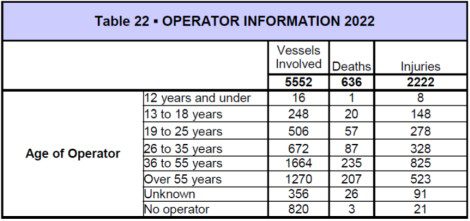
I would like to attribute the relative safety of young boat operators to the Coast Guard and Coast Guard Auxiliary’s Public Education program. We have increased the number of youth programs overall, with many boating safety presentations made in school programs. When we teach a boating safety course, we document the number of persons under 17 in age and how they did on the exam. The figures may just correlate to the percentage of young operators compared to the total. Interestingly, the table from last year shows the exact same pattern as 2022. I have recreated it below, as the 2021 statistics tables could not be copied and pasted.
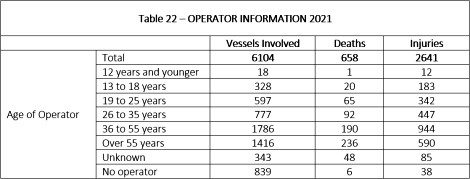
The statistics clearly show that age is a factor in the number of boating accident deaths and injuries, but they don’t show why.
We Don’t Need No Education (Pink Floyd)
Well, maybe we need a little bit; especially boater safety education. The chart below shows that boater safety education is clearly a factor in the number of deaths due to boating accidents.
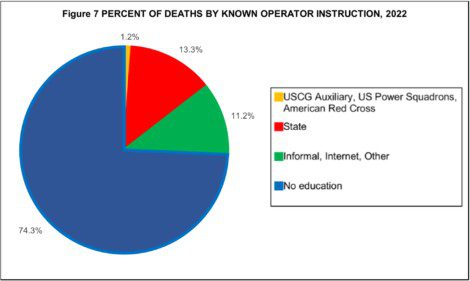
Almost three fourths of the boat operators involved in a boating accident had no boating safety education. Coast Guard regulations require that any boat operator, with few exceptions, born after August 31, 1993, must have taken a state-certified boater education course and carry their certificate with them on the boat. That means, today, that anyone over 30 years old isn’t required to have taken a boater education course. The Coast Guard Vessel Safety Check form asks vessel examiners to document whether a boater has had a boater education course. Although we don’t report this to the Coast Guard, a “No” answer is a pretty good hint to the examiner that the boater may need a little more attention than the boater who has taken a course. I go a little further by asking those who said “Yes” how long ago did they take the course and tailor my recommendations to their response. The first part of the Vessel Safety Check involves checking for the required safety equipment. The second part involves Coast Guard recommendations. I particularly reach out to the boat operators who are not required to have a boater education certificate, because the statistics show that their age group is involved in 58% of the reported boating accidents.
Are You Experienced?
Are You Experienced was the debut studio album by the Jimi Hendrix Experience. It is regarded as one of the greatest albums of all time and established a new direction in psychedelic and hard rock music. Be that as it may, boat operator experience appears to have an inverse relationship with the number of boating accidents; the more experience you have, the higher the number of accidents. Are these people just making the same mistakes all over again over the years until their lack of boater education finally catches up with them?
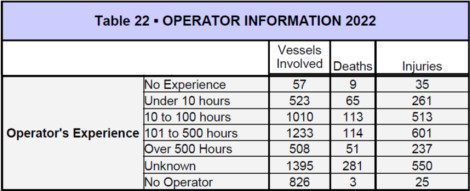
If you never learned how to do something properly, all the experience in the world is not going to save you if you are doing something wrong in the first place. I hear a lot of misinformation from so-called experienced boaters.
As a side note, “No Operator” often refers to a dockside accident in which the operator is not aboard. Slips and falls are high on the list of accident causes. Boarding and deboarding a boat can be a dangerous prospect if there are waves that cause the boat to rise and fall. These accidents are often drownings because the person involved either hadn’t put on a life jacket or had removed it prior to deboarding. If you are on the dock you should still have a life jacket on, especially if you intend to board or deboard a boat. I once performed a vessel safety check on a cabin cruiser whose owners had run up and down the Gulf of Mexico, including trips to the Bahamas. When I asked to see their life jackets, they handed me their self-inflating life jackets that they always wore while underway for the past three years. Imagine their shock when I showed them that the CO2 cylinders had never been installed.
How Many Persons Are Onboard?
An overloaded boat is often the cause of fatal accidents where the boat sank and passengers drowned. The highest number of boating accidents in which someone died involved boats with only the operator aboard. Don’t go boating alone! If you fall overboard or are ejected, there is no one to save you. On the other end of the spectrum, don’t overload your boat. Your capacity plate is a good guide to how many persons you can safely carry, but you must also look at the weight limitation when deciding on number of passengers. When you compare the maximum weight to the number of passengers, you will see that the average passenger weight based on the total weight allowance is only about 150 pounds. How many 150-pound adults do you know?
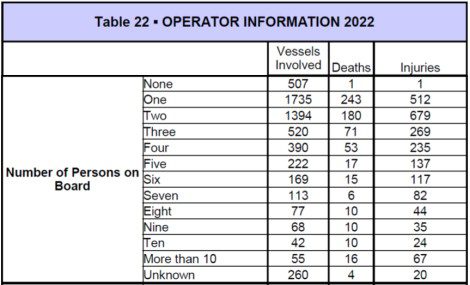
One thing for you to remember as the boat operator: you are ultimately responsible for all persons on board your boat. You must ensure that your passengers are properly distributed, that they are instructed to remain in their seats while the boat is moving, and they should be wearing a life jacket.
Summary
We can learn a lot about safe boating by examining the Recreational Boating Statistics. Boating safety experts will analyze several years of statistics looking for trends so the Coast Guard can see how their safety program is working and can adjust the program as needed. As a boat operator you can take away several things from this very short analysis:
- Experience is nothing without knowledge
- Age may be a negative safety factor
- Three fourths of the boating accidents involved operators with no instruction
- Operating alone or with just one passenger can be an accident factor
- Taking a boater education course may save your life
[BC: Jul-18-2023]

 Posted in
Posted in 
























I am in that older group and would like to study the state handbook before taking a course but I need a printed book to learn and my printer is not an option right now. It seems like it is all in PDF form which is probably fine for the younger kids but some of us older folks would like to buy a handbook. Is that available? If so, where? If not, is it a copyright thing to get printed at a print store? Thanks!